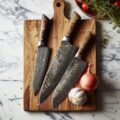Introduction to Japanese Knives
Japanese knives are synonymous with precision, craftsmanship, and exceptional quality. Renowned for their sharpness and durability, these blades have become a staple in both professional and home kitchens. For the aspiring home chef, investing in Japanese knives can significantly elevate your culinary skills.
Types of Japanese Knives
There are several types of Japanese knives, each designed for specific tasks:
- Gyuto: The Japanese equivalent of the Western chef’s knife, used for a variety of tasks.
- Santoku: A versatile knife suitable for slicing, dicing, and mincing.
- Yanagiba: A long, slender knife ideal for slicing raw fish, often used in sushi preparation.
- Deba: A heavy-duty knife used for filleting fish and butchering poultry.
- Petty: A small utility knife perfect for intricate work and peeling.
Why Choose Japanese Knives?
Japanese knives stand out due to their superior craftsmanship and unique features:
- Sharpness: Japanese knives are known for their razor-sharp edges, making precise cuts effortless.
- Durability: Made from high-quality steel, these knives hold their edge longer and are resistant to wear.
- Balance and Control: The ergonomic design ensures a comfortable grip, providing better control over slicing and chopping.
- Artistry: Many Japanese knives are handcrafted, showcasing intricate designs and attention to detail.
Maintaining Your Japanese Knives
To keep your Japanese knives in optimal condition, follow these maintenance tips:
- Regular Sharpening: Use a whetstone to maintain the sharpness of the blade.
- Proper Storage: Store your knives in a knife block or on a magnetic strip to prevent damage.
- Hand Washing: Always hand wash your knives with mild detergent and dry them immediately to prevent rusting.
- Avoid Hard Surfaces: Use a wooden or plastic cutting board to avoid dulling the blade.
Best Brands of Japanese Knives
Several brands are renowned for their exceptional Japanese knives:
- Shun: Known for their high-quality Damascus steel and beautiful craftsmanship.
- Global: Famous for their lightweight design and razor-sharp edges.
- Masamoto: A favorite among professional chefs for their traditional hand-forged blades.
- Tojiro: Offers a range of affordable yet high-quality knives.
- Miyabi: Combines German engineering with Japanese aesthetics for precision and beauty.
FAQ
1. Are Japanese knives better than Western knives?
It depends on personal preference and the type of cooking you do. Japanese knives are typically sharper and more precise, while Western knives are generally more robust and versatile.
2. How often should I sharpen my Japanese knives?
It’s recommended to sharpen your Japanese knives every 3-6 months, depending on how frequently you use them.
3. Can I use a honing steel on Japanese knives?
It’s better to use a whetstone for sharpening and maintaining the edge of Japanese knives, as honing steels may be too abrasive.
4. Are Japanese knives worth the investment?
Yes, Japanese knives are a worthwhile investment for serious home chefs. Their sharpness, durability, and craftsmanship make them a valuable addition to any kitchen.
5. What is the difference between a Gyuto and a Santoku knife?
While both are versatile, a Gyuto is more similar to a Western chef’s knife with a pointed tip, whereas a Santoku has a flatter edge and is better suited for chopping.









